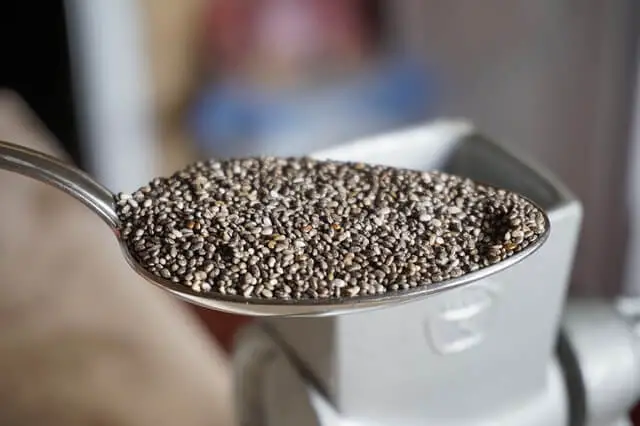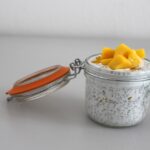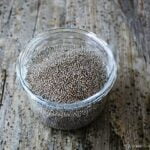
While chia seeds do offer numerous health benefits, it is important to be aware of the potential dangers of consuming chia seeds.
In this post, we will explore the risks of choking, allergic reactions, digestive discomfort, and nutrient interactions when it comes to chia seeds. By understanding these dangers, we can make informed decisions about whether or not to incorporate chia seeds into our diet and, if we do choose to consume them, how to do so safely.
- Are Chia Seeds Dangerous?
- How Much Chia Seeds Should You Eat a Day?
- How to Eat Chia Seeds Safely
- Final Thoughts
Are Chia Seeds Dangerous?
While chia seeds are generally considered safe and beneficial for most people, there are a few potential dangers to be aware of.
One potential danger of chia seeds is the risk of choking. Chia seeds can absorb large amounts of liquid and expand, which can cause them to get stuck in the throat if they are not chewed properly. To prevent this, it is important to drink plenty of water when consuming chia seeds and to chew them thoroughly.
Another potential danger of chia seeds is the risk of allergic reactions. Some people may be allergic to chia seeds and may experience symptoms such as skin rash, hives, difficulty breathing, and swelling of the face, lips, tongue, or throat. If you have a known allergy to chia seeds or have experienced allergic reactions to other seeds or nuts, it is important to avoid consuming chia seeds or to use caution when trying them for the first time.
Chia seeds are also high in fiber, which can cause digestive discomfort in some people if they are not used to consuming large amounts of fiber. When introducing chia seeds into your diet, it is important to start with small amounts and gradually increase your intake to allow your body to adjust. If you experience digestive discomfort after consuming chia seeds, such as bloating, gas, or diarrhea, you may want to reduce your intake or consider using a different source of fiber.
Another potential danger of chia seeds is the risk of nutrient interactions. Chia seeds are high in oxalates, which are compounds that can bind to certain minerals in the body and prevent their absorption.
This can lead to deficiencies in minerals such as calcium and iron, especially in people who already have low levels of these minerals. If you have a history of mineral deficiencies or are taking supplements or medications that can interact with minerals, it is important to talk to your healthcare provider before adding chia seeds to your diet.
In addition, chia seeds contain phytic acid, which is a compound that can inhibit the absorption of certain nutrients. While this is not necessarily a danger, it is important to be aware of if you are using chia seeds as a source of nutrients.
To maximize the absorption of nutrients from chia seeds, it is recommended to soak them in water or another liquid before consuming them, as this can help to break down the phytic acid and improve the bioavailability of the nutrients.
Finally, it is important to note that while chia seeds are generally considered safe, they are not a magic bullet for health and should not be used as a substitute for a healthy, balanced diet. As with any food, it is important to consume chia seeds in moderation and to speak with a healthcare provider before adding them to your diet if you have any concerns or underlying health conditions.
In conclusion, while chia seeds are generally considered safe and beneficial for most people, there are a few potential dangers to be aware of. These include the risk of choking, allergic reactions, digestive discomfort, nutrient interactions, and the potential for nutrient absorption to be inhibited by phytic acid.
To minimize these risks, it is important to drink plenty of water when consuming chia seeds, start with small amounts and gradually increase your intake (as little as 1 tsp of chia everyday), and soak them in water or another liquid before consuming them, or grind them. (You can learn some best ways to eat them at How to Eat Chia Seeds – 12 Ways)
(You can read any potential risks associated with females at Chia Seed Side Effects in Females)
Chia Seeds Side Effects on the Thyroid
One potential side effect of chia seeds on the thyroid is the risk of goiter. Goiter is an enlargement of the thyroid gland and can be caused by a deficiency in iodine, a mineral necessary for proper thyroid function.
Chia seeds are high in fiber and may interfere with the absorption of iodine in the body, potentially leading to a goiter. To minimize this risk, it is recommended to consume iodine-rich foods such as seaweed, dairy products, and seafood in addition to chia seeds.
How Much Chia Seeds Should You Eat a Day?
To minimize any dangers associated with chia seeds, we want to be mindful of how much chia seeds we are eating daily. It’s important to not consume too many chia seeds to avoid any negative effects. How much chia seeds should be eaten?
First and foremost, it is important to note that the recommended daily intake of chia seeds varies based on factors such as age, sex, weight, and activity level. As a general rule, it is recommended to consume no more than one to two tablespoons of chia seeds per day.
It is also important to gradually increase your intake of chia seeds, starting with small amounts and gradually working your way up, to allow your body to adjust. (Learn more at How Much Chia Seeds Should You Eat a Day?)
It is also worth noting that chia seeds are high in fiber, and consuming large amounts of fiber can cause digestive discomfort in some people. If you experience bloating, gas, or diarrhea after consuming chia seeds, you may want to reduce your intake or consider using a different source of fiber.
Additionally, chia seeds can interact with certain nutrients in the body, leading to deficiencies in minerals such as calcium and iron. They also contain phytic acid, which can inhibit the absorption of certain nutrients. To maximize the absorption of nutrients from chia seeds, it is recommended to soak them in water or another liquid before consuming them.
How Much is Too Much Chia Seeds Per Day?
The recommended daily intake of chia seeds varies based on factors such as age, sex, weight, and activity level. As a general rule, it is recommended to consume no more than one to two tablespoons of chia seeds per day. (See How Much is Too Much Chia Seeds Daily?)
However, if you are trying to lose weight, you may find it beneficial to go above two tablespoons, as mentioned in How Much Chia Seeds Per Day to Lose Weight). But do so gradually and start with a small amount first.
How to Eat Chia Seeds Safely
Here are some tips for safely consuming chia seeds:
- Gradually increase your intake: To allow your body to adjust to chia seeds, it is recommended to gradually increase your intake, starting with small amounts and gradually working your way up.
- Soak the seeds before consuming: To maximize nutrient absorption and minimize the risk of nutrient interactions, it is recommended to soak chia seeds in water or another liquid before consuming them.
- Drink plenty of water: Chia seeds have the ability to absorb large amounts of liquid and expand, which can cause choking if not chewed properly. To minimize this risk, it is important to drink plenty of water when consuming chia seeds and to take the time to chew them thoroughly.
- Listen to your body: If you experience bloating, gas, or diarrhea after consuming chia seeds, it may be a sign that you are consuming too much. It is important to listen to your body and reduce your intake if you experience any negative reactions.
- Speak with a healthcare provider: If you have any underlying health conditions or concerns, it is always best to speak with a healthcare provider before making any changes to your diet.
By following these guidelines, you can safely incorporate chia seeds into your diet and reap the benefits of this nutritious superfood.
If you are looking for ways to easily add chia seeds into your diet, see How to Eat Chia Seeds.
Final Thoughts
In conclusion, it is important to be aware of the potential dangers of consuming chia seeds. From the risk of choking and allergic reactions to digestive discomfort and nutrient interactions, it is crucial to exercise caution when adding chia seeds to your diet.
It is also important to speak with a healthcare provider if you have any underlying health conditions or concerns, as chia seeds may interact with certain medications or medical conditions. By understanding the potential risks and taking the necessary precautions, you can safely incorporate chia seeds into your diet and reap the benefits of this nutritious superfood.
Video Resource: Right Amount of Chia Seeds to Eat Every Day
Lance has been passionate about the plant-based diet and we have been following a whole food plant-based diet for over 5 years. We focus on health, natural healing, weight management, animal rights, and the health of the planet and environment by focusing on whole plant-based foods and sustainable practices.
Learn more at the About Me page and follow on social media at the links below.





